
The Beau Brummels was an American rock band. Formed in San Francisco in 1964, the band's original lineup included Sal Valentino, Ron Elliott, Ron Meagher, Declan Mulligan, and John Petersen (drums). They were discovered by local disc jockeys who were looking to sign acts to their new label, Autumn Records, where Sylvester Stewart—later known as Sly Stone—produced the group's early recording sessions. Initially, the band's musical style blended beat music and folk music and typically drew comparisons to the Beatles, while their later work incorporated other music genres such as psychedelic rock and country rock.
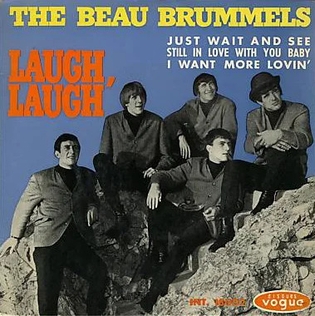
"Laugh, Laugh" is a song by American rock group The Beau Brummels, written by guitarist Ron Elliott and produced by Sylvester Stewart, later known as Sly Stone. Released in December 1964 as the band's debut single, the song reached number 15 on the U.S. Billboard Hot 100 chart the following February. "Laugh, Laugh" was the first hit single to come out of the emerging San Francisco music scene in response to the British Invasion. The song was later included on the band's first full-length album, Introducing the Beau Brummels, released in April 1965.

"You Tell Me Why" is a song by American rock group The Beau Brummels, from the band's second album, The Beau Brummels, Volume 2. The song was written by guitarist Ron Elliott and produced by Sylvester Stewart, later known as Sly Stone. "You Tell Me Why" was released as the album's lead single, and peaked at number 38 on the Billboard Hot 100 in August 1965. The band revisited the song and included it on their 1975 eponymous album. The original version later appeared on the band's 1987 compilation album The Best of The Beau Brummels 1964–1968.

Triangle is the fourth studio album by American rock band The Beau Brummels. Produced by Lenny Waronker and released in July 1967, it was the band's first album to include songs that vocalist Sal Valentino and guitarist Ron Elliott composed together. The band incorporated fantasy elements and surreal characters into the album's song titles and lyrics, and worked with a variety of session musicians to create Triangle's psychedelic musical style. The Beau Brummels were reduced to a trio—Valentino, Elliott, and Ron Meagher—at the time Triangle was recorded, as former group members Don Irving (guitars) and John Petersen (drums) left the band following the release of the group's previous album, Beau Brummels '66.

"Just a Little" is a song by American rock group The Beau Brummels. The song is included on the band's debut album, Introducing the Beau Brummels, and was released as its second single, following "Laugh, Laugh". "Just a Little" became the band's highest-charting U.S. single, peaking at number eight on the Billboard Hot 100 in June 1965. It also reached the top 10 of the charts in Canada and Australia.

The Beau Brummels were an American rock band that formed in 1964 and originally consisted of singer Sal Valentino, lead guitarist Ron Elliott, bassist Ron Meagher, rhythm guitarist Declan Mulligan and drummer John Petersen. Local radio disc jockeys Tom Donahue and Bobby Mitchell discovered the band at a club near San Francisco. They signed the Beau Brummels to their fledgling Autumn Records label, and their house producer, Sylvester Stewart, later known as Sly Stone, recorded the band's early sessions.
"Good Time Music" is a song originally recorded by American pop rock band the Lovin' Spoonful in 1965. Written by John Sebastian, it appeared on the 1966 Elektra Records compilation What's Shakin'. The song has been described as "a sort of manifesto of the group's optimism in its jaunty rhythms and celebration of the return of good time music to the radio."

Ronald Charles Elliott is an American musician, composer and record producer, best known as songwriter and lead guitarist of rock band The Beau Brummels. Elliott wrote or co-wrote the band's 1965 U.S. top 20 hits "Laugh, Laugh" and "Just a Little". In addition to reuniting with the Beau Brummels on occasion over the years, Elliott released a solo album in 1970, and has played on and produced albums by a number of other artists.
"Magic Hollow" is a song by American rock group The Beau Brummels, from the band's fourth album, 1967's Triangle. The song, written by guitarist Ron Elliott and lead singer Sal Valentino, was released as the album's first single. The song appeared on the band's 1987 compilation album The Best of the Beau Brummels 1964-1968, and "Magic Hollow" also served as the title of the band's 2005 four-disc box set.

The Beau Brummels is the sixth studio album by the American rock band of the same name. Released in April 1975, the album features the work of all five original band members for the first time since the band's debut album, 1965's Introducing the Beau Brummels. The album peaked at number 180 on the U.S. Billboard 200 albums chart in 1975.

Live! is a live album by American rock group The Beau Brummels. The album, released in August 2000 by Dig Music, was recorded in February 1974 near Sacramento, California, shortly after it was announced that the band had reunited. The album includes a mix of performances of their most commercially singles, including "Laugh, Laugh" and "Just a Little," as well as then-new material, some of which would be recorded for the band's 1975 eponymous studio album.
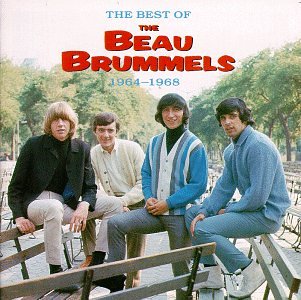
The Best of the Beau Brummels 1964-1968, sometimes titled The Best of the Beau Brummels: Golden Archive Series, is a compilation album by American rock band The Beau Brummels. Released in 1987 by Rhino Records, the album features 18 songs, including the band's biggest hit singles—"Laugh, Laugh", "Just a Little", "You Tell Me Why", and "Don't Talk to Strangers"—as well as songs which never appeared on an album before this collection, such as the 1967 single "Here We Are Again".

San Fran Sessions is a box set compilation which collects 60 demos, outtakes, rarities and unissued performances recorded by The Beau Brummels from 1964 to 1966. The three-disc set, released by Sundazed Records on June 11, 1996, includes alternate takes of the band's singles "Laugh, Laugh" and "Just a Little", as well as early versions of songs that were likely targeted for their never-completed third album on Autumn Records.
Not to be confused with Styx (band)
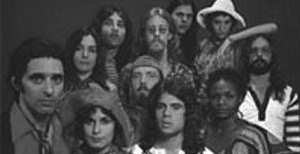
Stoneground was an American rock band formed in 1970 in Concord, California. Originally a trio, Stoneground expanded to a 10-piece band by the time of their eponymous 1971 debut album. The group appeared in two films, Medicine Ball Caravan (1971) and Dracula A.D. 1972 (1972), and released three albums before singer Sal Valentino quit in 1973. Three other band members—Cory Lerios, Steve Price and David Jenkins—left to form pop group Pablo Cruise. Stoneground continued as an act through 1982, with only Tim Barnes and Annie Sampson remaining from the early incarnation of the band. Barnes and Price led a re-formed Stoneground in 2003 and released a studio album the following year.
Donald Jay Irving is an American musician, best known as a guitarist for rock band The Beau Brummels. He was a member of the band for their Beau Brummels '66 album and joined a revamped lineup for a 2002 concert tour.
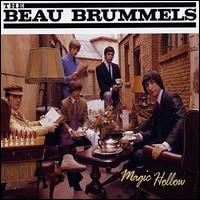
Magic Hollow is a box set compilation by The Beau Brummels comprising 113 songs recorded between 1964-1968, including hit singles, demos, outtakes, rarities and previously unissued material. The set was released on June 21, 2005 by Rhino Handmade.

"Here We Go Again" is a country music standard written by Don Lanier and Red Steagall that first became notable as a rhythm and blues single by Ray Charles from his 1967 album Ray Charles Invites You to Listen. It was produced by Joe Adams for ABC Records/Tangerine Records. To date, this version of the song has been the biggest commercial success, spending twelve consecutive weeks on the US Billboard Hot 100 chart, peaking at number 15.
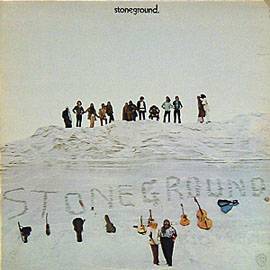
Stoneground is the debut studio album by American rock band Stoneground, released in 1971 on Warner Bros. The album featured seven different lead vocalists, including Sal Valentino on four of the album's ten songs.
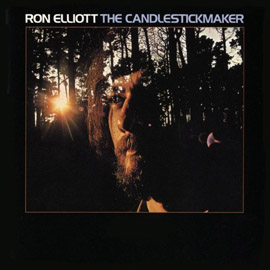
The Candlestickmaker is the lone solo album by American musician Ron Elliott, released in 1970 on Warner Bros. It was recorded following the dissolution of The Beau Brummels, with whom Elliott had been the chief songwriter and guitarist. A two-part, fifteen-minute piece titled "The Candlestickmaker Suite" comprises the entire second side of the album.














